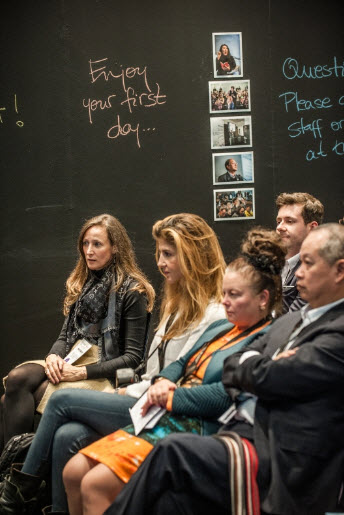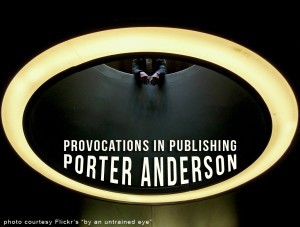“Bracing For It” in 19 Languages: AmazonCrossing Opens to Submissions
By Porter Anderson (@Porter_Anderson) | October 16, 2015 |
Looking for the Lingo

The audience at Frankfurt Book Fair’s Business Club listens to AmazonCrossing’s Sarah Jane Gunter talk about her program’s new open-submissions program. Image: Bernd Hartung for #FBM15
The first thing Bloomberg News’ Allesandro Speciale wanted to know when he sat down to interview me here at Frankfurt Book Fair’s Business Club is: “Is translation as big an issue this year as it seems?”
Answer: yes. As the glut of content in the book marketplace deepens, what could be more natural than to look to distant readerships for new sales?
Canelo publisher Michael Bhaskar said it in starkly frank terms during his onstage interview with me yesterday, Thursday:
There are too many books.
He’s right. The digital dynamic, in both the traditional and self-publishing sectors, has created an historically unprecedented level of competition among titles, among authors, among publishers. While the number of titles out there has exploded (with nothing going out of print nowadays, “digital is forever”), the audience size has not. For the most part, we’re producing exponentially more material for a readership that largely has stayed the same size and is being wooed by other electronic entertainment media.
Nowhere is the pressure of oversupply felt more keenly than in the strongest centers of self-publishing, the US and UK and, to a lesser degree, here in Germany.
The subject of how independent authors might go about finding affordable and reliable translation was big in our First Word day on international outreach at the Novelists Inc. conference earlier this month in St. Pete Beach. There, Jane Friedman focused on input from LiteraryTranslations’ Athina Papa, something Friedman and I returned to in The Hot Sheet on the topic.
Even for publishers, translation is no walk through the park. And for many independent authors, the $10,000 price tag that Papa quotes as the ballpark rate for a good translation is impossibly steep.
No wonder, then, that the news from AmazonCrossing has been so well received, and particularly by authors.
AmazonCrossing is the translation imprint of the Amazon Publishing wing—not self-publishing but contracted authors and translators (all of whom are paid royalties and on a monthly schedule, by the way, reflecting one way in which “APub” is not entirely traditional in its approach).
As I wrote at The Bookseller’s The FutureBook earlier in the week ahead of my onstage interview with AmazonCrossing chief Sarah Jane Gunter, the company has announced a $10 million commitment to translation.
A part of that allocation goes to the production in early 2016 of English translations of Indonesian writers, including (from the AmazonCrossing statement):
- Nirzona, a love story by Abidah El Khalieqy, set against the backdrop of the Aceh tsunami, a rare moment in recent history when the world’s eyes turned to Indonesia
- English-language originals The Oddfits and The More Known World, the first two titles in the Oddfits series from Indonesia-born Tiffany Tsao, a translator and past Indonesia editor at large for Asymptote Journal
- Paper Boats, a new adult love story from popular novelist, actress, and singer Dee Lestari
- A new edition of Laksmi Pamuntjak’s acclaimed A Question of Red and her latest, Aruna and Her Palate, which follows a food writer’s travels through Indonesia
- Hummingbird, a work of magical realism from Nukila Amal
 Indonesia is the Guest of Honour at this year’s Buchmesse, of course, and the more widely talked about point coming from Gunter’s team this week has been the opening of the AmazonCrossing process to submissions.
Indonesia is the Guest of Honour at this year’s Buchmesse, of course, and the more widely talked about point coming from Gunter’s team this week has been the opening of the AmazonCrossing process to submissions.
Is this, then, suddenly the preferred avenue for authors to offshore markets?
My provocation for you: It’s all very well to say that authors are not in competition with each other, as many indies like to assure us in that community-forever way. Unfortunately, it’s not true. Everyone is locked in a rising siege of competition. And when trying to break open new territory to get a leg up on that battle, translation may be the one area in which independent authors really aren’t as effective, on the whole.
Lots of horror stories are out there about bad translations bought by indies at ridiculous prices, only to have to be done over at more cost and with dubious results.
And once you’ve had a book translated, even beautifully, can you market it in another nation?
Giving AmazonCrossing a good, hard look may be the smartest move you could make, if you’re contemplating crossing the linguistic frontiers of bookselling today.
Inviting the World’s Authors to Submit
 One of our frequent FutureBook #FutureChat author participants is Catherine Ryan Hyde, an AmazonCrossing-translated author who speaks very highly of her experience. And self-publishers as widely known as J.A. Konrath, Barry Eisler, and H.M. Ward have been translated by AmazonCrossing, which makes a point of taking an eclectic approach to genre as well as to languages. (Nineteen languages so far, 29 countries, around 200 titles in five years.)
One of our frequent FutureBook #FutureChat author participants is Catherine Ryan Hyde, an AmazonCrossing-translated author who speaks very highly of her experience. And self-publishers as widely known as J.A. Konrath, Barry Eisler, and H.M. Ward have been translated by AmazonCrossing, which makes a point of taking an eclectic approach to genre as well as to languages. (Nineteen languages so far, 29 countries, around 200 titles in five years.)
Now, in answer to a lot of authors’ interest in the programme, AmazonCrossing has provided this site for submissions of material for potential submission, a URL already taking thousands of hits daily, Gunter told me, as writers spread the word that they now can submit. Here are the categories in which submissions are being taken:
- Fantasy
- Historical Fiction
- Literary Fiction
- Memoir
- Mystery, Thriller, and Suspense
- Romance
- Science Fiction
- Women’s Fiction
- Young Adult Fiction
‘Author-Centric’
“One of the reasons we started Amazon Publishing,” Gunter told me during our interview, “was to think about what an author-centric publishing experience would be.
One of the core desires of an author is not only to be a bestseller in their own language but to also reach a broader audience. and by making translations available to self-published authors [as well as traditionally published writers] we’re able to help satisfy that desire.
Are they ready for the load of submissions headed their way? Gunter says they are. “The staff is not large but dedicated, and we’ve had the opportunity to plan for this for some time.”
An author lucky enough to be picked up by AmazonCrossing gets not only a chance to be translated without having to try to cover the costs and market themselves in foreign contexts but also to have truly high-quality translation of their work by a translator who may have worked on the writings of highly visible, prize-winning authors.
[pullquote]Being overwhelmed with submissions would be the best news story we could have. — Sarah Jane Gunter, AmazonCrossing[/pullquote]
“And we go to great pains to give translators the credit they deserve,” Gunter says. “They’re an important part of creating these books.”
To find the best translators, she says, “We work with a number of the translators’ unions, both in the US and in Europe. We work with established literary translators, professors of literary translation, either to engage them in working with us or to recommend their colleagues in the field. We’ll be at ALTA, the American Literary Translators Association conference in a couple of weeks.”
While several platform-style translator-author sites have arrived—Babelcube is probably the best known—the jury is out on how effective these outfits can be in handling translation needs for most authors. What Papa stressed over dinner in Italy during the Matera Women Fiction Festival Writers’ Conference was that a collaborative relationship between author and translator is essential. The job can’t be done well in a vacuum.
Keep in mind that AmazonCrossing is rated by University of Rochester specialist Chad Post as having now become the largest translation house in the US market. Its capacity is probably as great or greater in this area than any other company’s. And yet, we’re talking about 75 titles per year at this point, which is not that many by comparison to the number of submissions piling up on the doorstep of that new site.
Nevertheless, Gunter is optimistic: “Being overwhelmed with submissions would be the best news story we could have.”
I’ve told her I’ll remind her she said that as the new submission site opened.
What about your work? Would you like to see it cross borders in other languages? Remember that a fully translated and marketed book is a different proposition from checking the boxes for other territories on a self-publishing platform. How important do you think it might be to go through a full-service publishing outfit like AmazonCrossing to get your work into international markets effectively?
[coffee title=”Wish you could buy Porter a glass of Campari?” icon=”glass”]Now, thanks to tinyCoffee and PayPal, you can![/coffee]











Porter-
No question about it, the quality of translation is primary when it comes to selling in other languages. There are other factors at work, though.
National tastes vary. Types of fiction that sell well in the U.S. do not necessarily sell well in every other country. Cultural references and context can also stop novels at the border crossing.
Legal thrillers by American authors, for instance, tend not to go over internationally because our legal system works differently than elsewhere. Romances don’t always feel romantic to readers in countries where courtship follows different patterns.
National pride nowadays also favors native language authors. Even in Canada, our near neighbor and a largely English-reading consumer base to boot, readers tend to support Canadian authors.
All of which is to say that getting translations out there is not the easy income enhancer that indie authors might like it to be. It’s not an automatic slam and dunk into your bank account.
Remember too that e-books have not been adopted as widely in the rest of the world as in the U.S. If that’s your only format your potential audience is even more limited than it is here.
Some novels can sell internationally, though. What makes the difference? Strangely, great fiction tends to sell great everywhere. That’s good news because that’s the factor that every author can control.
Don!
Thanks for the comment AND for the Campari, totally appreciated here in drizzly, chilly Frankfurt, you’ve warmed my overnight. :)
I think you and Sarah Jane Gunter at AmazonCrossing would find you’re in quite good agreement, particularly in the importance of a good story. This is one reason, Gunter tells me, that AmazonCrossing has gone much further afield than the literary fiction normally associated with translation. They like finding good stories in whatever genre category they lie and producing them as..good stories.
Seems no problem there. You’re right about the many vagaries and difficulties of overseas “translation” on the cultural scale — tricky, expensive to test, and hard to execute well, too, without people on the ground. Judith Curr at Novelists Inc in the First Word day I programmed there talked about the importance of Simon & Schuster’s “brand managers” in-country. Quite critical for shepherding work into a culture. Gunter’s AmazonCrossing uses its own in-country staffers as ersatz street teams to usher translated work into those markets.
Takes a big old village. :)
Thanks again, sir!
-p.
On Twitter: @Porter_Anderson
Very timely post for me. I (as an independent author/publisher) have just released a German translation of a novel in my mystery series. In spite of a rudimentary knowledge of German, I’m having a hard time doing the type of promotion I am able to do with the English titles in the series. I don’t want my attempts at promotion ruined by by “pidgin-German” so I need help even posting something to German Krimi groups on Facebook.
My translator is a big help, although she’s unfortunately had a personal issue that’s occupied much of her time since the release. My translator has also translated successfully for Amazon Crossing and I consider myself lucky that she approached me and that she has enough confidence in my series to take it on. However, I’m concerned that if this first novel doesn’t start to sell, she won’t be in a hurry to translate a second.
Still, it’s early days and I’m hopeful that once we find the right marketing channels, sales will pick up. (The book is available globally in ebook and trade paperback format, as all my books are.) The first review on Goodreads was good.
As to Don’s comment about Canadian readers supporting Canadian authors, I don’t find that the case. I am a Canadian author with a Canadian hero, and most of my fans are in the U.S. I sell more books in the U.S. and the U.K. than at home. Also, the reviews on Amazon.com are generally more positive than those on Amazon.ca. Don’t ask me why.
Ruth
Hey, Ruth, thanks for the input.
You might be interested in our colleague Matthias Matting’s new How To Publish in Germany work, just in case there’s something of use there for you: https://www.how-to-publish-in-germany.com/ We flew Matthias in to be with us for First Word day, which I programmed for Novelists Inc earlier this month on international issues, and he announced the new site and program then.
You’re putting your finger on the problem. And it parallels all of selfpub, of course. In this fall round of speaking engagements I’m on, I’m learning to put it into two fast sentences for authors:
Yes, you may be able to self-publish very well.
No, you may not be able to self-sell nearly as well.
And in the international arena, as you’re finding, this becomes so much tougher. How do you reach such an audience, how can they find you. “Discoverability” with a tall capital “D.”
Wish you all the best with it, keep plugging. Very interesting, your observations on the Canadian reactions, too, had not heard of this tendency re: a reception of their work in “the ‘hood.” :)
Thanks,
-p.
On Twitter: @Porter_Anderson
“AmazonCrossing has provided this site for submissions”
The link doesn’t work for me.
Thanks for the note, David, looks like a corrupted link was in there. I’ve re-seated it, should work for you now. Here it is, just so you don’t have to look for it in the story again, too: https://translation.amazon.com/submissions
Many thanks,
-p.
On Twitter: @Porter_Anderson
I remember a few years ago the industry! talking about how e-reader sales overseas had grown, but US sales had slowed down. It seems like Amazon is doing the same thing overseas it did here. Sell the reader,s get content for it. Which is smart, I guess. And a good opportunity for authors. It’s interesting that they are being more directive with this process, though. Perhaps because they have their own publishing forum, now?
Heck, yeah, I’d like to have good quality translation overseas. We’ve already talked about how my book is being pirated left and right in overseas market, so maybe they’d enjoy the story in their language. ;)
Thanks for the heads up. I’ll have to check it out!
Right, Lara, and thanks for the comment – this being one of the 14 imprints of Amazon Publishing, there’s a genuine commitment here to the growing body of translation produced by the house. (More than 200 titles, as I mention.)
I find it interesting that people don’t always like to concede that Amazon Publishing is a trade (or “traditional”) publishing house, but it is just that. When Catherine Ryan Hyde tells me about her (terrific) experience with AmazonCrossing and the Lake Union imprint, for example, she’s always incredibly complimentary of how the “APub” companies work so well with writers. (Paying them monthly, for example, is a non-traditional plus in a traditionally configured setting.)
So the selections of material are being made here by a staff providing really excellent translation.
Glad to hear you’re interested, and thanks again!
-p.
On Twitter: @Porter_Anderson
Porter,
Without your eyes (and passion), great swaths of the book world would move forward in relative obscurity. I so appreciate where you go and what you report back to us.
I hope to have a ‘translation problem’ in the next year or so.
Hey, Tom,
Thanks for the lovely note, it comes at a good moment, actually. I’m about 31,000 feet over Novia Scotia, moving back into North American airspace on my airlift out of Frankfurt and — as terrific as Buchmesse was this year, I’m very glad to be headed home for a few days on the ground before taking off for the next “great swath” of adventure in the book world. :)
Mr. Anderson flies and recommends Delta Air Lines exclusively, by the way, LOL, the very interesting part of that being that Delta writes “airlines” as two words, that’s it’s official spelling and something that sets it apart from most other airlines, I believe. Your note has reminded me that I need to ask Delta how this unusual spelling factor comes to be.
Great to hear that you’re interested in translation. In so many settings now, I’m finding this to be a very hot topic among authors, both in trade and selfpub settings, as everyone looks for wider markets to deal with the heavy competition among titles out there. All the best with it, and thanks again for the kind words!
-p.
On Twitter: @Porter_Anderson